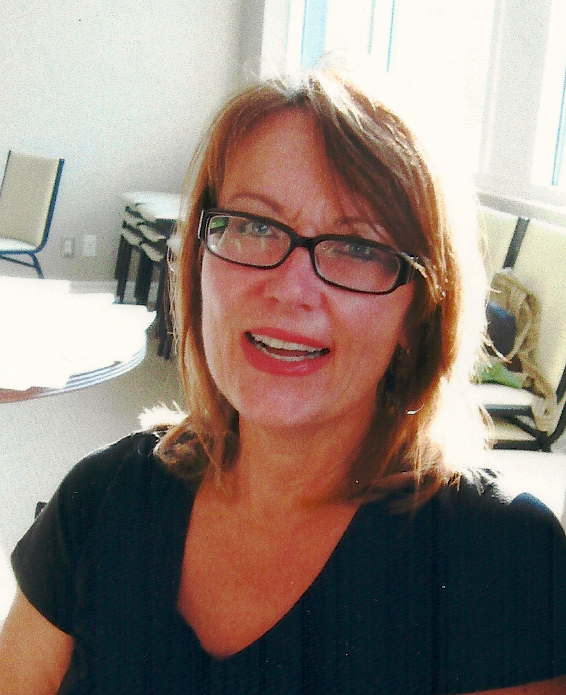OHS Insider #5
Aug 10, 2012 // OHS Newsletter
Introducing Your New OHS Homepage
One of the great things about conducting a study online is the opportunity to communicate with participants on a more personal level. With that goal in mind, we have created a new personalized homepage for you. This homepage features health information we think you may be interested in based on the answers you provided in your online questionnaire.
New (left) vs Old (right) Home Page:
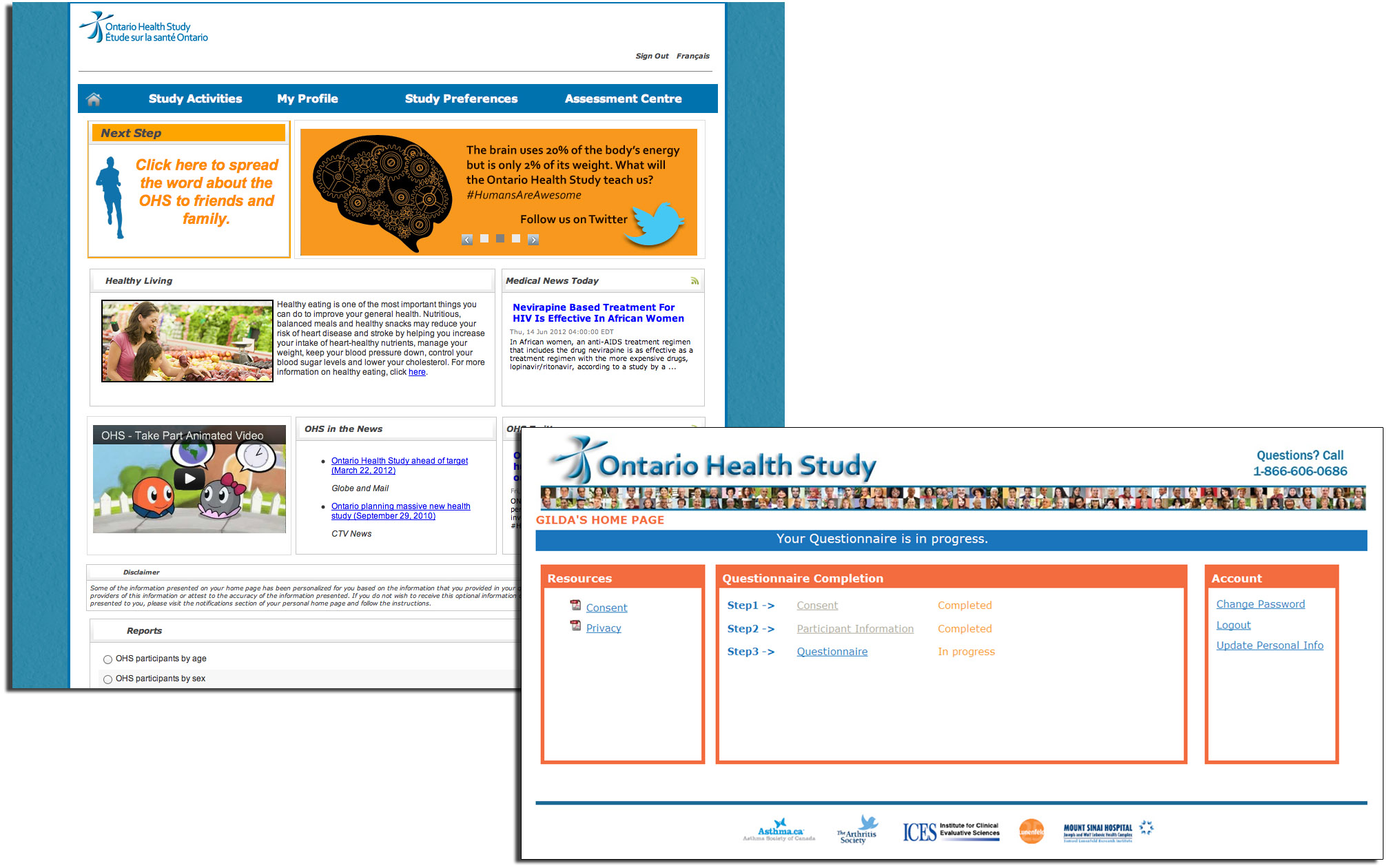
Your new homepage is where you’ll find health news tailored to your personal health status, interesting health-related articles, links to OHS videos and news, and a cool tool that lets you look up Study facts, such as the breakdown of OHS participants by age, sex and ethnicity. Your homepage is also where you can go to change your personal information or Study preferences (such as how often we contact you and your consent options) and it’s where we’ll contact you with information about follow-up questionnaires and OHS Assessment Centres. Keep an eye on the Next Step box in the upper left-hand corner of your homepage for updates on new OHS initiatives that you can take part in.
To learn about the exciting new features of your personalized homepage, please click here.
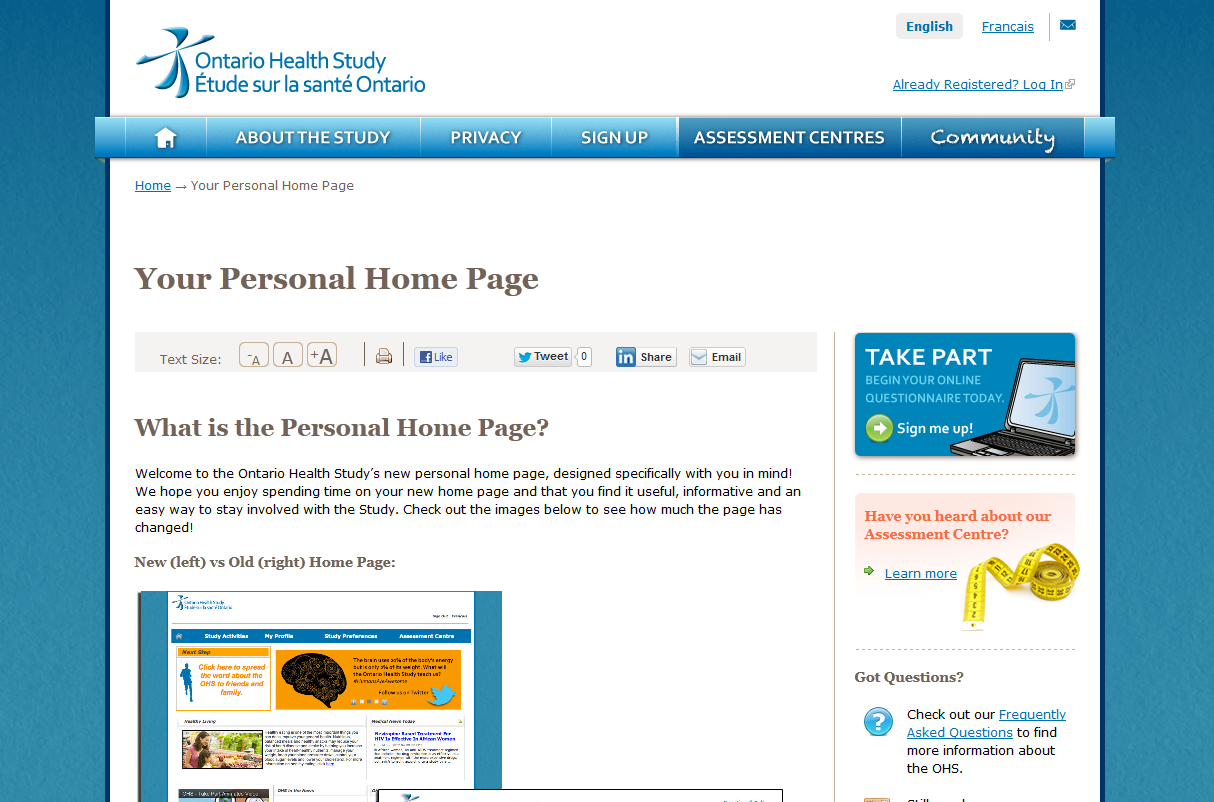
Welcome to the First OHS Assessment Centre!
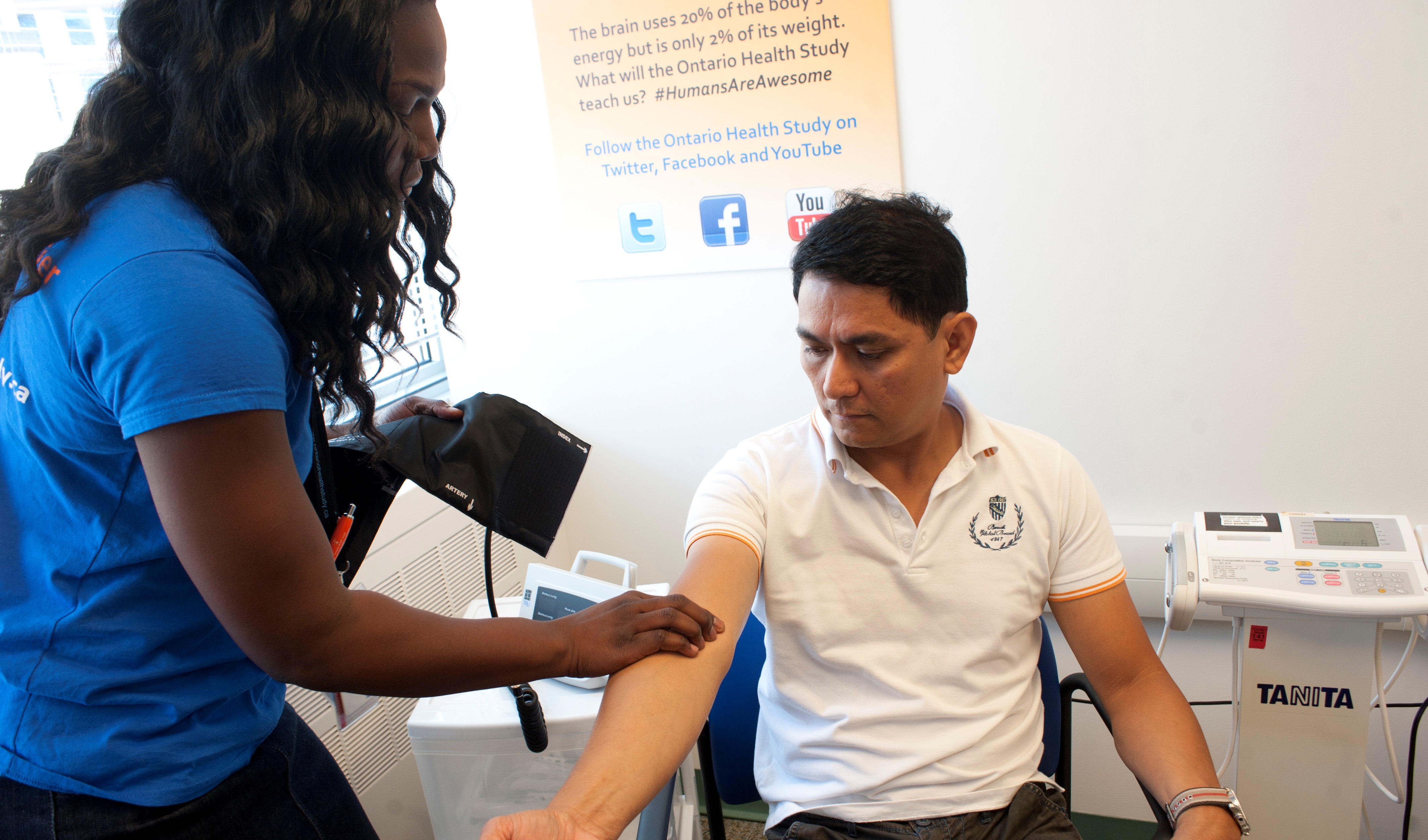
We are excited to tell you that the Ontario Health Study’s first Assessment Centre has opened. The Assessment Centre is located at 790 Bay Street in downtown Toronto.
At the Assessment Centre, you will have the opportunity to participate in physical measurements, such as tests of your lung function, heart rate, blood pressure and body fat. You will receive the results of these tests. If you choose to provide a blood sample while at the Assessment Centre, a complete blood count will be conducted, giving you an overall picture of your health. And you will receive a measurement of the long-term level of sugar in your blood.
By visiting the Assessment Centre, you will help researchers better understand the factors that affect health and quality of life. This may help to improve the prevention and diagnosis of chronic diseases such as cancer, diabetes and heart disease. An added bonus is that your Assessment Centre appointment may enable you to learn something new about your health!
To learn more about the OHS Assessment Centre, visit this link.
News You Need to Know
Drumroll please…
More than 224,000 have completed the OHS baseline questionnaire as of August 1! We’d like to thank all of you for taking part and for spreading the word among your family, friends and colleagues. We look forward to your ongoing involvement with the Study. If you’re interested in learning about ways to help the Study by becoming an OHS Community Champion, please click here.
Have you provided your Health card number to the Study? Why you should…
If you have consented to data linkage, please consider providing the Study with your Health card number if you haven’t already done so. Doing this improves the Study because it allows us to link the information you provide in your questionnaire with administrative health data that is already being collected, such as the fact that you had a mammogram or prostate exam. This allows researchers using OHS data to ask a broader range of questions, such as whether screening programs are effective or if there are “hot spots” across the province where certain diseases are more common. It also means that we’ll get a more accurate overall picture of your health and that, ultimately, we’ll be able to reduce the number of questions we ask when you’re filling out an OHS questionnaire.
As always, your privacy is extremely important to us. To safeguard your personal information, your data is stored with all identifying information removed – this means any information that can identify you, such as your name and address, date of birth or Health card number, is removed from your data and stored separately. The OHS encrypts all the information you provide to the Study to ensure that your data remains confidential.
To see the level of consent that you have agreed to (and whether you have agreed to data linkage), visit Study Preferences > Consent Form.
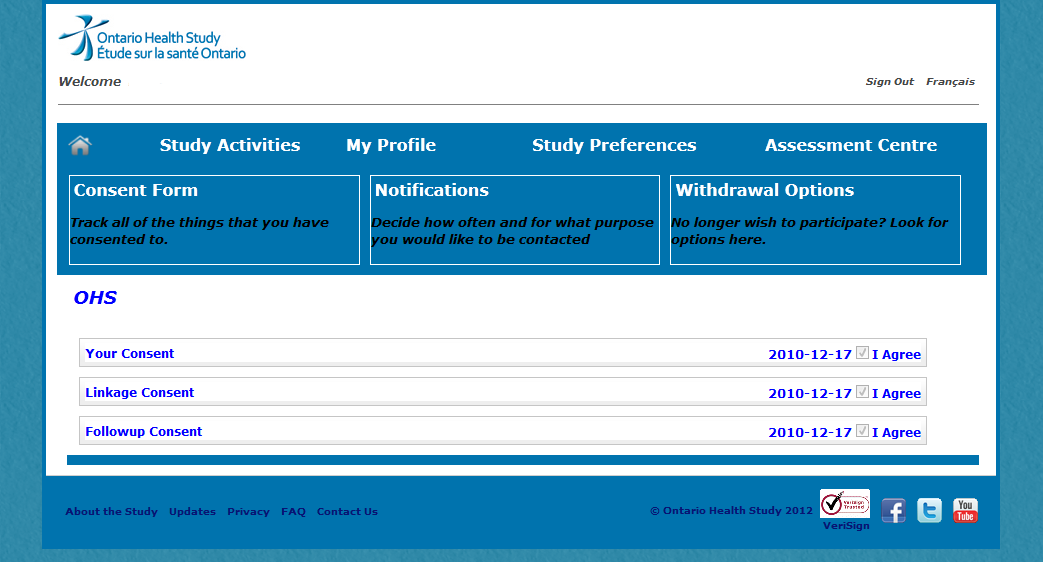
To provide your Health card number (after you have ensured that you’ve consented to data linkage) please go to My Profile > Personal Information and enter your Health card number.
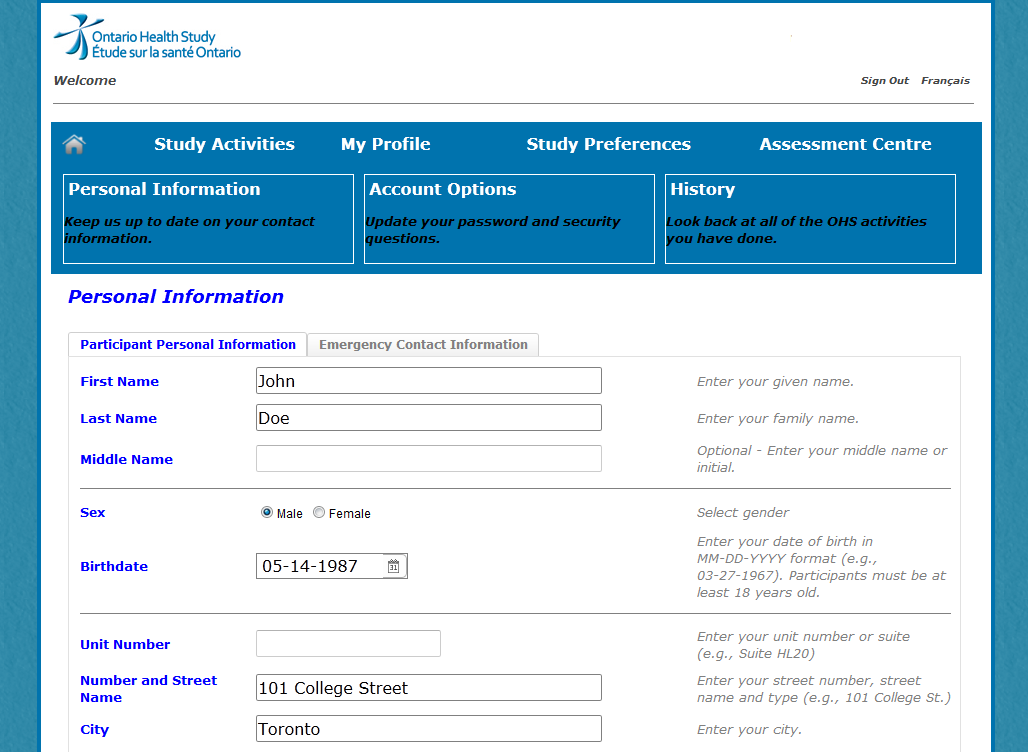
Please stay in touch
If you’ve changed any of your contact information (address, phone, email), please log in to your OHS homepage and update it. If you’ve provided information for contacts outside your household (whom we contact only if our efforts to contact you prove unsuccessful), please update that information if necessary.
Health Research Using OHS Data
It is estimated that one in five Canadians will experience a mental illness in their lifetime. One of the first studies to be granted access to data from the OHS will examine health factors and mental health. It will use data gathered during the pilot phase of the Ontario Health Study through questions asked regarding social support, stress factors at home and work, symptoms of depression and anxiety, and stressful life events. This research study may help identify health factors that contribute to mental disorders within Ontario, eventually resulting in health measures aimed at reducing the effects of mental disorders.
Why I Take Part in the OHS: Ivona
|
|
As long as I can remember, I have been a health information ‘junkie.’ I subscribe to numerous medical and health information newsletters via email and Facebook and eagerly read any articles on health and medical research in my daily newspaper. When I was diagnosed with stage III colorectal cancer, my diagnosis only increased my hunger for information. I spent hours in front of the computer researching the disease, the treatments, the survival statistics, the risk factors and anything remotely related to my condition. So it came as a bit of a shock that so many of the questions that I posed to my oncologist were answered with a simple, “we don't know.” The fact that I have been living a healthy lifestyle and have no family history of cancer just reiterated the fact that there is still so much we do not know about the causes of this disease. I was excited when I first saw the Ontario Health Study and felt this type of survey was long overdue. It is a good start in the long journey of documenting our present health picture with the hope of filling in some of the knowledge blanks and reducing the number of “we don't knows.” I sincerely hope that one day we will '’know,” and, ultimately, be able to prevent this killer. |
Meet an OHS researcher: Dr. Kathy Pichora-Fuller
Kathy Pichora-Fuller is a member of the Ontario Health Study’s Audiology working group. She visited the new Assessment Centre recently to train staff on using the audiology sound booth, which will be used at the Assessment Centre in the near future.
|
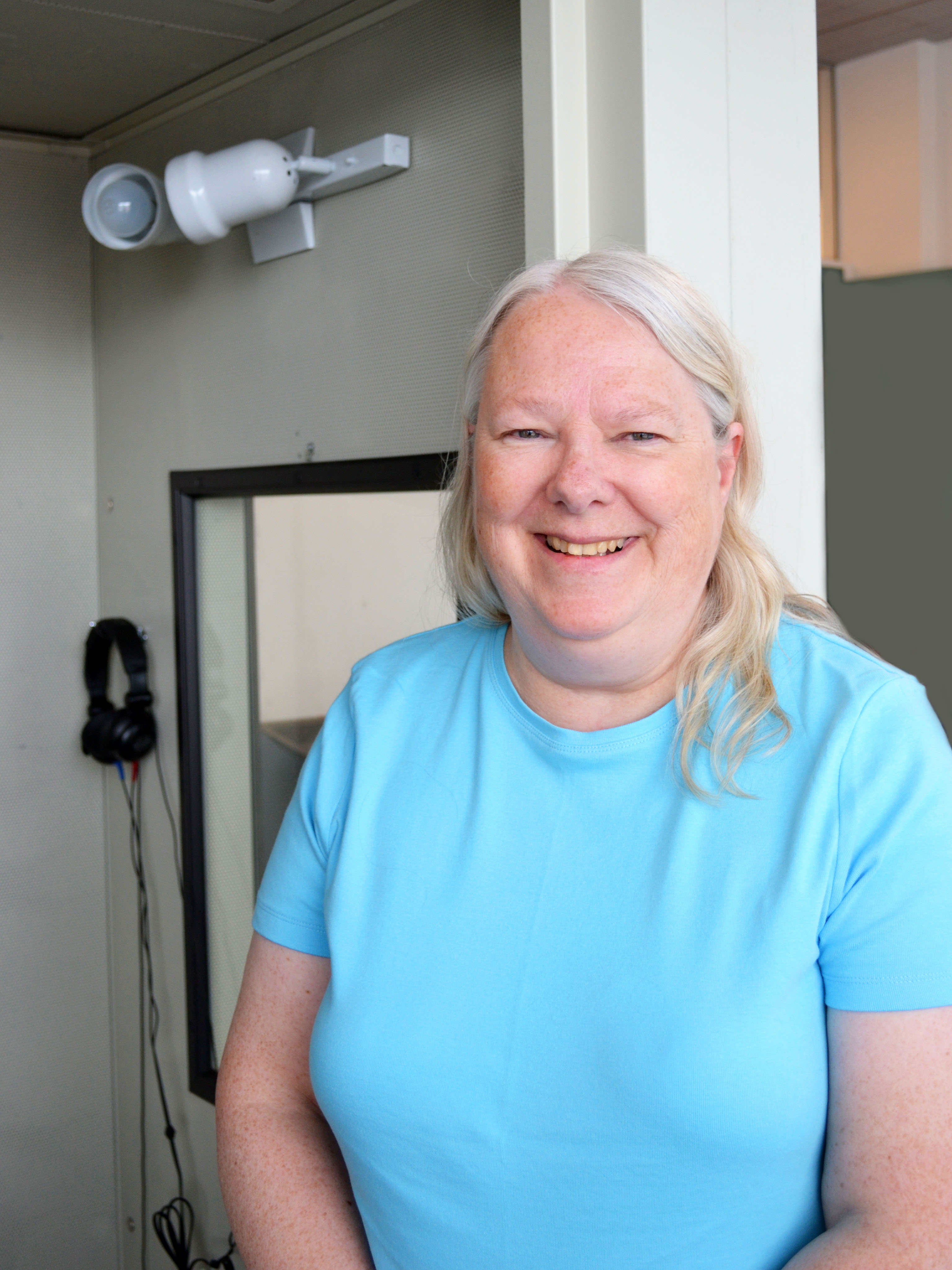 |

